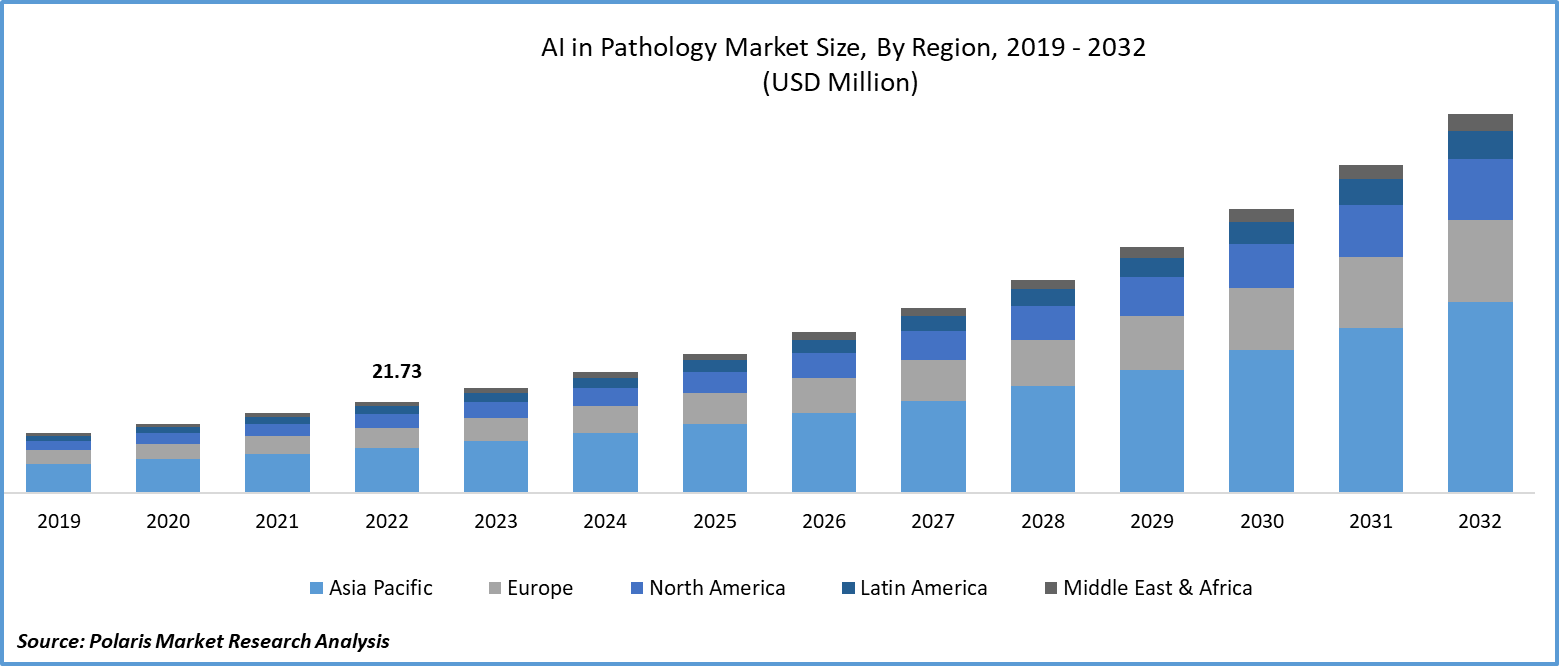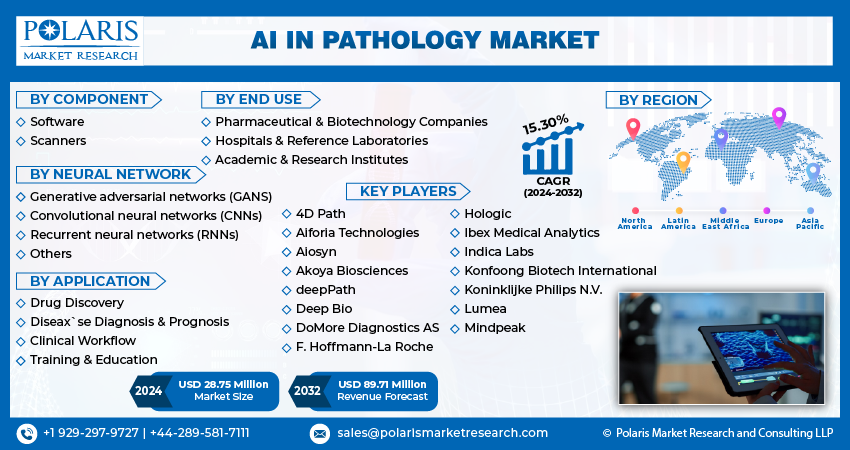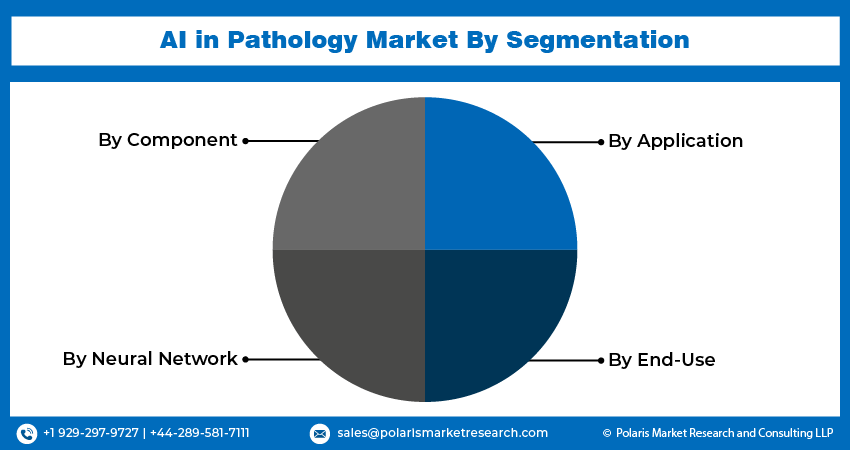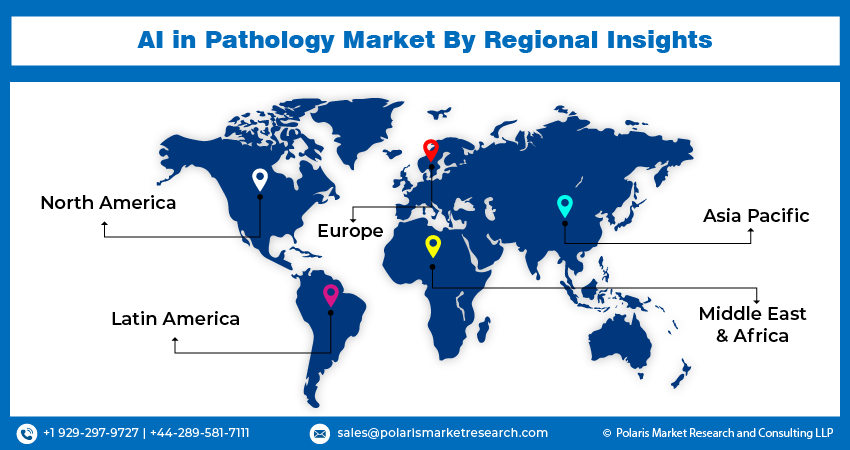
AI in Pathology Market Share, Size, Trends, Industry Analysis Report, By Component (Software, Scanners); By Neural Network; By Application; By End User; By Region; Segment Forecast, 2024- 2032
- Published Date:Jan-2024
- Pages: 116
- Format: PDF
- Report ID: PM4095
- Base Year: 2023
- Historical Data: 2019-2022
Report Outlook
The global AI in pathology market was valued at USD 24.99 million in 2023 and is expected to grow at a CAGR of 15.30% during the forecast period.
Pathology is known as the study of diseases, which is a collective point between science and medicine. The growing world population is creating a need for efficient healthcare infrastructure and laboratories to provide quality care to patients. Lower healthcare staff is enabling the use of artificial intelligence in pathology. The increasing studies on the use of technology, especially artificial intelligence and machine learning, are increasing awareness about its benefits to pathologists.

To Understand More About this Research: Request a Free Sample Report
- For instance, in May 2023, a study published in the Wiley online library focused on how to use artificial intelligence in pathology. It plays a crucial role in assisting pathologists in their daily work along with the clinical trials. The study concluded with the benefits of AI in pathology.
Moreover, the ability of AI algorithms to analyze a larger amount of data in less time with higher accuracy is driving its adoption in pathology labs, as it assists them in understanding the patient's condition quickly and proposing reliable medication. Furthermore, the pandemic stimulated the demand for remote healthcare checkups, which, in a way, fueled the expansion of telepathology services, in which the use of AI is vital.

However, the need for infrastructure, the installation of technology, and training are hampering the installation of artificial intelligence in laboratories, mainly in smaller healthcare centers, due to higher costs.
Growth Drivers
- The global spread of diseases is driving the utilization of artificial intelligence
Technological advancements in artificial intelligence are enabling a rapid shift in every task done by humans, primarily in the healthcare sector. Viruses and diseases are growing day by day, and pharmaceutical research and pathology studies are going to conserve human health from diseases. A 2021 study published in PubMed Central focused on the use of artificial intelligence in pathology, primarily cancer. Rapid digitalization is driving the use of machine learning and artificial intelligence in the study of diseases. A study conducted a 70-patient pilot trial on the diagnosis of breast cancer. The sensitivity for the detection of micro-metastases ranges from 83.3% by a pathologist alone to 92.2% by a pathologist and a computer algorithm. As the number of studies focusing on the use of technology in artificial intelligence increases, there will be huge potential for AI in pathology market.
Report Segmentation
The market is primarily segmented based on component, neural network, application, end user and region.
|
By Component |
By Neural Network |
By Application |
By End Use |
By Region |
|
|
|
|
|
To Understand the Scope of this Report: Speak to Analyst
By Component Analysis
- Software segment is expected to witness the highest growth during the forecast period
The software segment is projected to grow at the highest CAGR during the projected period due to the growing adoption of artificial intelligence software in pathology driven by a reduction in pathologists time, accuracy, and speed of outcomes, making doctors understand the patient's condition quickly and planning recovery medication as soon as possible. Furthermore, the storage of patient health information and retrieval of reports can be done efficiently with AI, driving the need for pathology software in the study period.
By Neural Network Analysis
- Conventional neural network segment accounted for the largest market share in 2022
The conventional neural network segment accounted for the largest market share. This is attributable to AI's ability to image analyze pathology slides and recognize patterns in tissues, driving the workflow efficiency of pathologists as pathologists can do repetitive tasks. In contrast, pathologists can focus on clinical trials and interpretation of results. These factors are contributing to the rising application of artificial intelligence in pathology in the near future.
By Application Analysis
- Drug discovery segment held the significant market revenue share in 2022
The drug discovery segment held a significant market share in revenue in 2022, which is highly influenced by the growing cases of illicit drugs at the global level. AI algorithms can analyze large population data and identify patterns and trends, which can assist in estimating the effectiveness of new drugs for individual patients. Furthermore, researchers are starting to utilize AI to identify the origin of diseases, proteins, and vitamins. This process improves the safety and effectiveness of drugs for end users, boosting their demand during the study period.
By End User Analysis
- Hospitals and reference laboratories segment held the significant growth in 2022
The hospitals and reference laboratories segment witnessed significant market growth in 2022, which was highly accelerated due to the growing volume of cases. Hospitals and reference laboratories are more likely to handle more cases related to the pathology day by day. As the workload for pathology tasks increases, there will be a need for AI, driven by its effectiveness in providing consistent outcomes along with the time-saving nature of AI software. Furthermore, AI assists hospitals in cutting back on the need for more pathologists to handle increased cases. This will further create new growth opportunities for the global market in the coming years.

Regional Insights
- Asia Pacific region registered the largest global market share in 2027
The Asia Pacific region witnessed the global market. The growing use of artificial intelligence in healthcare industries in developing countries like India & China is fueling the growth of AI in the pathology market. According to NASSCOM, the healthcare AI market in India is projected to grow at a 40% CAGR by 2025. This demonstrates the rising adoption of artificial intelligence in the healthcare industry, which may further fuel its use in pathology, driven by its capability to finish repetitive tasks quickly and save pathologists’ time. The existence of lower-level pathologists in the region is influencing healthcare providers to adopt artificial intelligence as it can do certain tasks of pathologists, boosting its demand throughout the study period in the region.
The North American region is expected to be the fastest-growing region, with a healthy CAGR during the projected period, owing to the rising adoption of telemedicine. COVID-19 stimulated the use of telemedicine rather than direct appointments due to stringent lockdown regulations. According to the US Department of Health and Human Services, since the pandemic, Medicare beneficiaries have increased their use of telemedicine in the United States. In-person healthcare visits in the US were registered at 1.1 billion in 2019 and 989 million in 2020.
The number of telemedicine appointments increased from 8,40,000 in 2019 to approximately 52.7 million in 2020. As this trend is likely to grow, driven by lower transaction costs, there will be a need for the utilization of AI-based tools, which can help doctors treat patients from a distance. As this region experiences the demand for telemedicine, there will be a need for AI in pathology in the coming years.

Key Market Players & Competitive Insights
The AI in pathology market is witnessing rapid expansion fueled by rising product innovations, collaborations, partnerships, mergers, and acquisitions among the key market players. The rising evolution of technological innovations is driving their adoption in the pharmaceutical industry.
Some of the major players operating in the global market include:
- 4D Path
- Aiforia Technologies
- Aiosyn
- Akoya Biosciences
- deepPath
- Deep Bio
- DoMore Diagnostics AS
- F. Hoffmann-La Roche
- Hologic
- Ibex Medical Analytics
- Indica Labs
- Konfoong Biotech International
- Koninklijke Philips N.V.
- Lumea
- Mindpeak
Recent Developments
- In November 2021, a study published in BioMed Central focused on the use of artificial intelligence in medicine, specifically in pathology. It reviewed the use of AI in surgical pathology and elaborated on the ability of AI to enable pathologists to focus on higher-level diagnostic and personal care for patients.
AI in Pathology Market Report Scope
|
Report Attributes |
Details |
|
Market size value in 2024 |
USD 28.75 million |
|
Revenue forecast in 2032 |
USD 89.71 million |
|
CAGR |
15.30% from 2024 – 2032 |
|
Base year |
2023 |
|
Historical data |
2019 – 2022 |
|
Forecast period |
2024 – 2032 |
|
Quantitative units |
Revenue in USD million and CAGR from 2024 to 2032 |
|
Segments covered |
By Component, By Neural Network, By Application, By End User, By Region |
|
Regional scope |
North America, Europe, Asia Pacific, Latin America, Middle East & Africa |
|
Customization |
Report customization as per your requirements with respect to countries, region and segmentation. |
